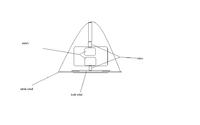lightning r fun
Member level 1

if you took a gyroscope wheel, and spun it in one direction, then took another wheel, put it around the first, and spun it in the opposite direction, what would happen?
would it cancel out gravity and levitate?
would it just fall over?
would it be more stable?
would it just downright defy gravity and fall up?
untitled is pic of side view
untitled 2 is bottom view


would it cancel out gravity and levitate?
would it just fall over?
would it be more stable?
would it just downright defy gravity and fall up?
untitled is pic of side view
untitled 2 is bottom view




